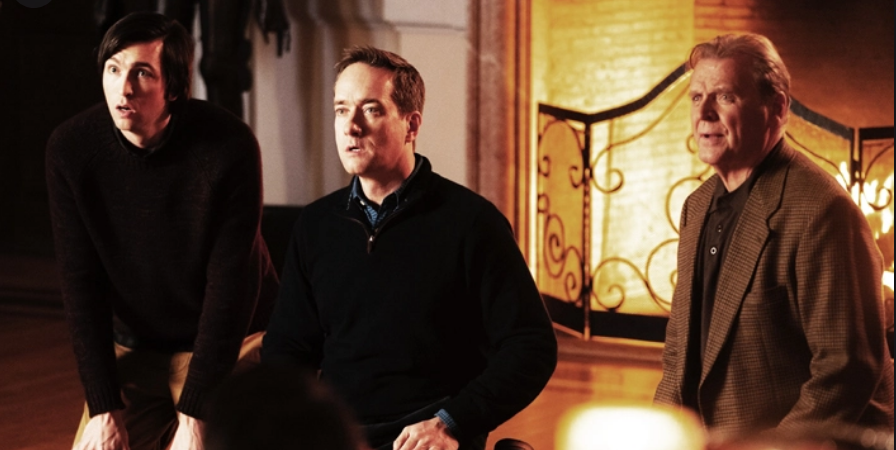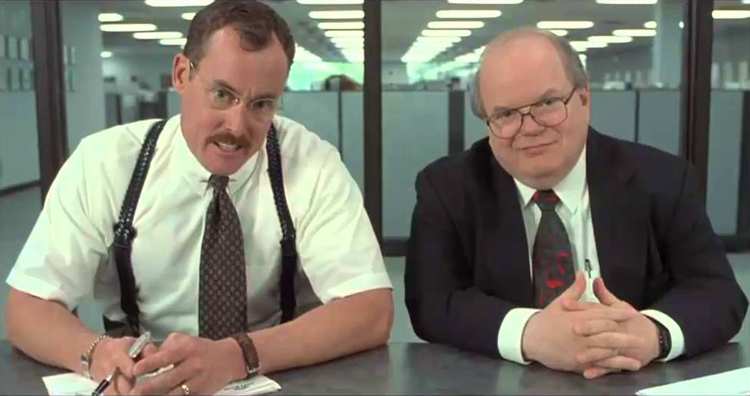
The Great Unraveling they’re calling it, what’s happening to our society right now. A little melodramatic, I know; headlines are just words after all, and it’s gotten so hard to tell what’s hype and what’s not, how much of what we’re hearing is Internet-land hysteria and what’s actually, well, true. So maybe “unraveling” is a bit bold when it comes to civilization itself. The stoplights are still working here in Virginia. My Internet service provider keeps providing.
The term might be more apt, though, when it comes to personal well-being. What I mean is that people clearly feel like they’re unraveling — emotionally, relationally, spiritually — and no doubt that distress is informing our larger stage. Writing for the Intercept, Glenn Greenwald observed:
Lurking beneath the headlines justifiably devoted to these major stories of 2020 are very troubling data that reflect intensifying pathologies in the U.S. population — not moral or allegorical sicknesses but mental, emotional, psychological and scientifically proven sickness. Many people fortunate enough to have survived this pandemic with their physical health intact know anecdotally — from observing others and themselves — that these political and social crises have spawned emotional difficulties and psychological challenges.
He goes on to relay the findings of that intensely troubling report the CDC issued a few weeks ago about suicidal ideation during the pandemic. Maybe you know the one:
One question posed by researchers was whether someone has “seriously considered suicide in the past 30 days” — not fleetingly considered it as a momentary fantasy nor thought about it ever in their lifetime, but seriously considered suicide at least once in the past 30 days. The results are staggering.
For Americans between 18-24 years old, 25.5 percent — just over 1 out of every 4 young Americans — said they had. For the much larger group of Americans ages 25-44, the percentage was somewhat lower but still extremely alarming: 16 percent. A total of 18.6 percent of Hispanic Americans and 15 percent of African Americans said they had seriously considered suicide in the past month. The two groups with the largest percentage who said yes: Americans with less than a high school degree and unpaid caregivers, both of whom have 30 percent — or almost 1 out of every 3 — who answered in the affirmative. A full 10 percent of the U.S. population generally had seriously contemplated suicide in the month of June.
Those numbers hold true for clergy, btw. It would appear that we are living through a crisis of hopelessness that can only be called — sorry! — unprecedented. As Greenwald puts it, “A society in which such a vast swath of the population is seriously considering [self-harm] as an option is one which is anything but healthy, one which is plainly failing to provide its citizens the basic necessities for a fulfilling life.” Ooof.
Lest we foist all the blame on COVID, my sense is that our internal landscape largely dictates our external one (Mark 7). Meaning, unhappy people cannot help but sow discord and reactivity, whatever ideology they claim to hold. Circumstances just amplify those things.
So fulfillment, such as we’ve conceived it, is faltering big-time. This makes a cruel kind of sense, I suppose. Because if there’s any place that Americans rely on for fulfillment (AKA justification, purpose, community), it’s the office. And the pandemic has taken away the best parts of many of our jobs. At least the camaraderie and affirmation side of things.
It’s a crippling blow, especially considering that career, etc. still represents our single most dominant form of seculosity. That is, no matter how ascendant other forms may be (politics!), people are more likely to sacrifice their love life or their politics for their résumés than the other way round. “Success” almost always wins in practice, however large the spiritual-emotional cost.

Cue the long-form article that appeared in the the NY Times Magazine this past weekend, “God Is Dead. So Is the Office. These People Want to Save Both” by Nellie Bowles. As a number of readers/listeners have noted, Bowles has delivered what is essentially a primer on the seculosity of work, profiling an emerging class of spiritual consultants who are seeking to help corporate America formalize, consolidate, and leverage their religious appeal. Here’s how Bowles describes the field:
They go by different names: ritual consultants, sacred designers, soul-centered advertisers. They have degrees from divinity schools. Their business is borrowing from religious tradition to bring spiritual richness to corporate America … [They] blend the obscure language of the sacred with the also obscure language of management consulting to provide clients with a range of spiritually inflected services, from architecture to employee training to ritual design.
Their larger goal is to soften cruel capitalism, making space for the soul, and to encourage employees to ask if what they are doing is good in a higher sense. Having watched social justice get readily absorbed into corporate culture, they want to see if more American businesses are ready for faith […] What they have in common is an agreement that traditional religious institutions are not working and that corporate culture is largely soulless.
Their consensus is that while attendance at formal services is at a historic low, people are still looking for meaning and spirituality. Dudley Rose, the associate dean for ministry studies, noted that secular spaces were doing a surprisingly good job of fulfilling this desire. “People were meeting what they identified as spiritual needs, but doing them in organizations that had no apparent spiritual connection,” Mr. Rose said in an interview. “Like SoulCycle. People would cite SoulCycle.”
[…] If part of religious work is finding people in need wherever they are, then spiritual innovators should go toward the workplace.
Needless to say, there are more than a few eye-rolling moments in the article, and yes, there’s something pretty cynical about the whole enterprise.
I have to admit, though, my gut reaction was more one of admiration and maybe a little envy. I mean, this mode of meaning-making is already happening unconsciously, so why not help people do it more effectively (and make a buck in the process)? The workism cat is not going back in the bag. Not after generations of graduation speeches about the necessity of following one’s dreams from 9-5.
Plus, going to “people in need wherever they are” — rather than waiting for them to come to you — strikes me as an undeniably pastoral urge. Christians have been doing this under the auspices of “the theology of work” for at least two decades, to say nothing of all those who’ve made “vocation” such a buzzword beyond confessional Lutheran circles.

And yet, lest we gloss over every reservation, Bowles articulates the chief hesitation:
It’s hard to exhort workers to give their professional activities transcendental meaning when, at the same time, those workers can be terminated. “It can be done badly, and when done badly it can cause harm,” Ms. Thurston said. “For example, ‘How can we be in deep community if I can fire you?’”
The answer is, you can’t. Not really. The threat of termination necessitates that we hold something back in our interactions. Employment demands some degree of curation and deference, which is the opposite of genuine intimacy. You cannot be fully honest with someone who can take away your livelihood, no matter what guarantees they may offer. Maybe that’s why Jesus called his disciples away from their jobs.
But all that notwithstanding, hasn’t the pandemic revealed the fundamental hollowness of the seculosity of work? If not, what more needs to happen? Jobs can — and do — vanish at the snap of someone’s fingers. Or the sound of their cough, as the case may be. The enoughness (and community) they offer us, while not negligible, is incredibly provisional. Perhaps this is why the whole trend isn’t ultimately worth losing much sleep over. Let the glitch in this particular matrix do its, uh, work.
One last thought: So much of this work involves helping companies devise a bespoke set of rituals. But are people really that hungry for ritual? I know we’re eager for stability and some semblance of normalcy amidst the earthquakes of the last few months. And I would never begrudge an office for wanting some guidance on what to do when someone dies or a traumatic event occurs. Yet when I think of what I’ve missed about church of late, “ritual” as such is at the very bottom of the list.
I suppose that’s a little unfair. “Rituals” are there to signify deeper things, after all. At their best, they “enflesh” some metaphysical schema, usually in a communal setting. They simply point to what we’re ultimately after, which is meaning. Not just any meaning but meaning that entails hope for us personally — a reason to live and not die, an enoughness that transcends performance reviews or our employer’s bottomline.
Maybe that’s too much to ask for. Perhaps the most we can hope for is a place to go when we unravel: a small, unprofitable corner of real estate where the only consultants in attendance are there to comfort and absolve.
Someone (in management) to undergo the unraveling in our place would only be a bonus.

COMMENTS
4 responses to “Spiritual Consultants at the Gates of a Great Unraveling”
Leave a Reply













Thank you for this article. I wish to push back just slightly on your ending comment about whether or not people are really craving ritual. I work with teens and have seen this first hand. I can only assume that it has been based on to the workplace via the “Gen-Z Effect.” One only need to look at the “helped wanted” sign at your local Starbucks, which reads “Be part of something larger than yourself, work here.” It reminds me of the Ka’an song when he raps, “They don’t understand the power of significance, more than brilliance and certainly more than dividens”
This secular age has flattened our world so much that Gen-Z believes they have been dropped off here by a space craft. No connection to the past, no traditions because they have all been deconstructed, and no vision for the future. I mean even this year graduation ceremonies became a youtube video, stripped of all meaning.
Rituals are doorways, liminal spaces that moves us from what was on to what will be. Without them our young people and even ourselves are left to wallow in the malaise of modernity.
Thank you for the thoughtful comment, RJ. I suppose the appeal has to do with how you define ‘ritual’ and, even more than that, the content of the ritual in question. But I definitely take your point. People are hungry hungry hungry to be a part of something larger and more durable than what technology offers.
You can’t help workers to give transcendental meaning to what they do if you can fire them.
Around 1800 Anglican parish priests were quite often magistrates. The question was asked: How can you punish someone in your court on a weekday, and then on Sunday, expect them to hear the good news of God’s grace and mercy from your lips.
You can’t!
You can’t help workers to give transcendental meaning to what they do if you can fire them.
Around 1800 Anglican parish priests were quite often magistrates. The question was asked: How can you punish someone in your court on a weekday, and then on Sunday, expect them to hear the good news of God’s grace and mercy from your lips.
You can’t! I have never commented on an article in Mockingbird before, and have not said this